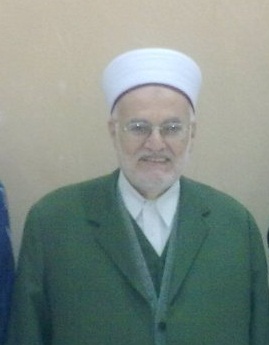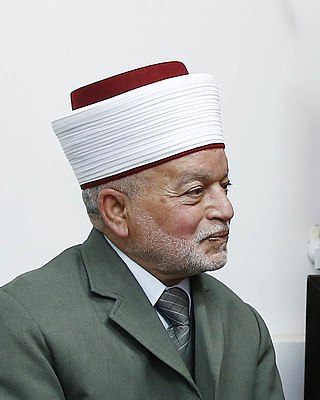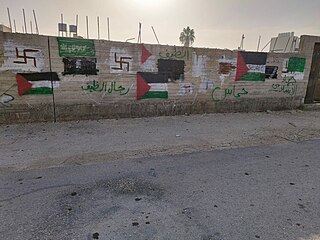
Mohammed Amin al-Husseini was a Palestinian Arab nationalist and Muslim leader in Mandatory Palestine. Al-Husseini was the scion of the al-Husayni family of Jerusalemite Arab nobles, who trace their origins to the Islamic Prophet Muhammad.

Sheikh Ekrima Sa'id Sabri is a religious leader and former Grand Mufti of Jerusalem and Palestine from October 1994 to July 2006. He was appointed by Yasser Arafat.
The Supreme Muslim Council was the highest body in charge of Muslim community affairs in Mandatory Palestine under British control. It was established to create an advisory body composed of Muslims and Christians with whom the High Commissioner could consult. The Muslim leaders, however, sought to create an independent council to supervise the religious affairs of its community, especially in matters relating to religious trusts (waqf) and shariah courts. The British acceded to these proposals and formed the SMC which controlled waqf funds, the orphan funds, and shariah courts, and responsible for appointing teachers and preachers. The SMC continued to exist until January 1951, when it was dissolved by Jordan and its function transferred to the Jordanian Ministry of Awqaf.
Sheikh Taissir Bayood al-Tamimi (Arabic: شيخ تيسير التميمي is the chief Islamic judge of the Palestinian National Authority.

Husayni is the name of a prominent Palestinian Arab clan formerly based in Jerusalem, which claims descent from Husayn ibn Ali.
Nashashibi is the name of a prominent Palestinian family based in Jerusalem.
The Palestinian people are an ethnonational group with family origins in the region of Palestine. Since 1964, they have been referred to as Palestinians, but before that they were usually referred to as Palestinian Arabs. During the period of the British Mandate, the term Palestinian was also used to describe the Jewish community living in Palestine.

Muhammad Ahmad Hussein is the incumbent Grand Mufti of Jerusalem. He was appointed in July 2006 by Mahmoud Abbas, the President of the Palestinian National Authority. Abbas raised Hussein as an immediate successor to Ekrima Sa'id Sabri, who was reportedly removed from the position due to his growing popularity amidst his open expressions of highly contentious political views and his condoning of violence in the Israeli–Palestinian conflict.
Mohammed Tahir Mustafa Tahir al-Husayni was the Qadi of the Sharia courts of Jerusalem and was the father of Kamil al-Husayni and Mohammad Amin al-Husayni, both of whom held the equivalent position in the British mandated period of Grand Mufti of Jerusalem.

Hussam al-Din Jarallah was a Sunni Muslim leader of the Palestinian people during the British Mandate of Palestine and was the Grand Mufti of Jerusalem from 1948 until his death.
Sulaiman Ja'abari was a Sunni Muslim religious leader of the Palestinian people and the fifth Grand Mufti of Jerusalem. He became Grand Mufti in 1993 until his death in 1994.

Kamil al-Husayni was a Sunni Muslim religious leader in Palestine and member of the al-Husayni family. He was the Hanafi Mufti of Jerusalem from 1908, and in 1918 the British Mandate authorities appointed him as the first “Grand Mufti of Jerusalem“, a title they had copied from the Grand Mufti of Egypt. The British referred to him as “the representative of Islam in Palestine and a member of the oldest nobility of the country”.

Rashid al-Haj Ibrahim (1889–1953) was a Palestinian Arab banker and a leader of the Independence Party of Palestine (al-Istiqlal). He was one of the most influential Arab leaders of Haifa in the first half of the 20th century and played a leading role in both the 1936–39 Arab revolt and the 1948 Battle of Haifa.

Racism in the Palestinian territories encompasses all forms and manifestations of racism experienced in the Palestinian Territories, of the West Bank, Gaza, and East Jerusalem, irrespective of the religion, colour, creed, or ethnic origin of the perpetrator and victim, or their citizenship, residency, or visitor status. It may refer to Jewish settler attitudes regarding Palestinians as well as Palestinian attitudes to Jews and the settlement enterprise undertaken in their name.
The Palestine Arab Congress was a series of congresses held by the Palestinian Arab population, organized by a nationwide network of local Muslim-Christian Associations, in the British Mandate of Palestine. Between 1919 and 1928, seven congresses were held in Jerusalem, Jaffa, Haifa and Nablus. Despite broad public support their executive committees were never officially recognised by the British, who claimed they were unrepresentative. After the British defeat of Ottoman forces in 1918, the British established military rule and (later) civil administration of Palestine. The Palestine Arab Congress and its organizers in the Muslim-Christian Associations were formed when the country's Arab population began coordinated opposition to British policies.

The Arab Higher Committee or the Higher National Committee was the central political organ of Palestinian Arabs in Mandatory Palestine. It was established on 25 April 1936, on the initiative of Haj Amin al-Husayni, the Grand Mufti of Jerusalem, and comprised the leaders of Palestinian Arab clans and political parties under the mufti's chairmanship. The committee was outlawed by the British Mandatory administration in September 1937 after the assassination of a British official.
This is a timeline of intercommunal conflict in Mandatory Palestine.

Palestinian nationalism is the national movement of the Palestinian people that espouses self-determination and sovereignty over the region of Palestine. Originally formed in opposition to Zionism, Palestinian nationalism later internationalized and attached itself to other ideologies; it has thus rejected the occupation of the Palestinian territories by the government of Israel since the 1967 Six-Day War. Palestinian nationalists often drawn upon broader political traditions in their ideology, examples being Arab socialism and ethnic nationalism in the context of Muslim religious nationalism. Related beliefs have shaped the government of Palestine and continue to do so.

Islamic Leadership in Jerusalem refers to the leading cleric (ulema) of the Muslim community in Jerusalem. Historically, the primary religious leader was the Qadi. During the late Ottoman Empire, the Muftis became pre-eminent, particularly the Mufti of the Hanafi school, and during the British military administration the post of Grand Mufti of Jerusalem was created, which continues today.
Saad el-Din el-Alami was a Sunni Muslim religious leader of the Palestinian people and the fourth Grand Mufti of Jerusalem, in office from 1952 until his death.












